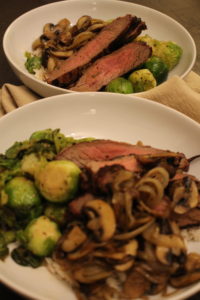Eating Fat Will Not Make You Fat

We’ve all seen the magazine covers advertising something along the lines of “15 Snacks Under 200 calories” or “6 Dinners Under 500 calories.” They promise to help you shed weight by eating as little as possible, often at the price of compromising taste and cutting important ingredients like healthy fats. I was raised on this belief like most people my age, and fully bought into the idea. Year ago when I was being “good” while grocery shopping, I would make sure to buy fat-free skim milk (when I still drank milk), low-fat 100-calorie packets of cookies and cereal or crackers that claimed to be lower in calories and fat than the others, all the while avoiding anything with the word “fat” even written on it.
The interesting part is that this was when I was my heaviest and unhealthiest.
Now, here’s an example of a homemade meal I ate this past weekend. Sautéed Brussel sprouts, mushrooms and onions cooked in some local, organic butter over some rice, and a grass-fed flank steak from a local farm. It was totally delicious and so filling and satisfying I didn’t feel the need to eat for hours and hours after I ate this meal. But, this shift in mindset around consuming fat didn’t happen overnight for me. It took a lot of research, learning, and self-experimentation before I began to realize how wrong I had been to reduce fats from my diet.

While the misconceptions around consuming fat have begun to shift in the past few years, we are often still downright fearful of eating fat ever since the low-fat diet movement began in the 1970s. Not only has this created fear of consuming high quality foods with a high fat content like avocados, nuts, seeds, olive and coconut oils, it has often led us to believe that low-fat foods are superior. Here’s the catch: packaged or processed foods advertised as “low-fat” must make up the taste that fat provides somehow, and it usually comes in the form of sugar, artificial sweeteners and other ingredients that are hard on the body and often difficult to digest.
The really scary part is when you start to examine the relationship between the low-fat movement and the obesity rate:
While I strongly believe that there are several other major factors contributing to the increase of obsesity, the shift to foods low in fat is not a coincidence. Our ancestors did not have the obese population that we do today. Even our grandparents were in significantly better shape than we are overall in Western society, and there has been research showing that the today’s children (U.S. study) may be the first generation to have a shorter life expectancy rate than their parents, despite more advanced technology and health care.
Something is wrong with this picture. Overall, we are by far the more informed we have ever been thanks to the Internet. However, we’re so bombarded with info it can be difficult to cut through the noise and find out what really matters. Yes, scientifically speaking, calories matter. What these magazines and other sources are failing to point out is that calories are far from the ONLY thing that matters when it comes to the way we eat.
Fat contains 9 calories per gram, the the highest number of calories proportionately compared to the other macronutrients carbohydrates and protein, which both contain 4 calories per gram respectively. Fats are required to transport many nutrients throughout the body such as essential fat-soluble vitamins A, D, E and K. This means that it is important to eat a little bit of fat with each meal to ensure you absorb these vitamins. Additionally, they are also an essential part of our cell membranes and fat helps regulate our body temperature and our hormones. They are also crucial to the health of our nerves and our brain, particularly the hippocampus which controls memories and emotions.
However, the quality of fats is what matters the most and skimping on the good stuff simply won’t do, just as eating too many fats, particularly of lower quality, can do us harm. It’s a fine balance, and this is where moderation comes into play as opposed to focusing on the number of calories consumed. Sourcing high quality sources of fats primarily found in nuts, seeds, meats, dairy, olives, peanuts (legume), and avocados is important to gain the benefits these healthy fats have to offer.

Instead, I advocate for including fats as part of a healthy lifestyle. No need to count calories, you can simply begin by adding in half an avocado on top of your salad, cooking your vegetables in coconut oil or butter, or adding an extra generous drizzle of olive oil atop your sautéed kale. Every once in a while if you want to get an idea as to what you are consuming and have some serious athletic goals to achieve, counting calories could potentially be helpful. However, it can easily become an obsessive way of controlled eating and I believe that eating in a more intuitive way is the healthier approach for our bodies and our minds.
The best part is that you may be pleasantly surprised at the results. By introducing high quality fats into the meals you consume, you will be left feeling more satiated and much less likely to feel the need to snack, and over time this is when people often see positive changes in their bodies and feel their best from the inside out.
Let’s stop eating in a way that makes it all about numbers. Let’s eat for enjoyment, for strong muscles, for bodies that can support chasing after our dogs in the park or playing with our kids, and most importantly let’s eat for health.


